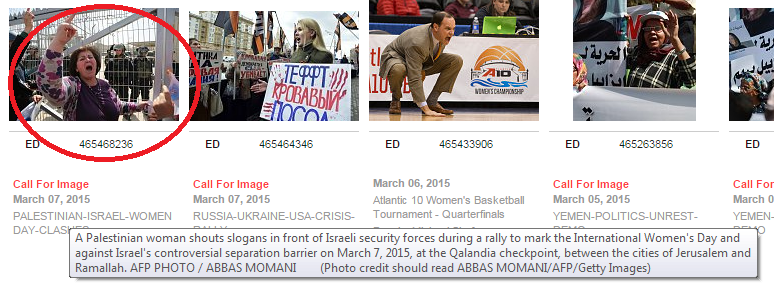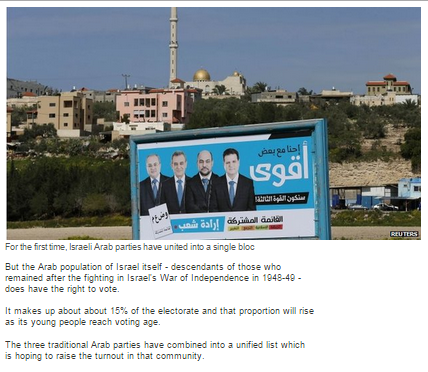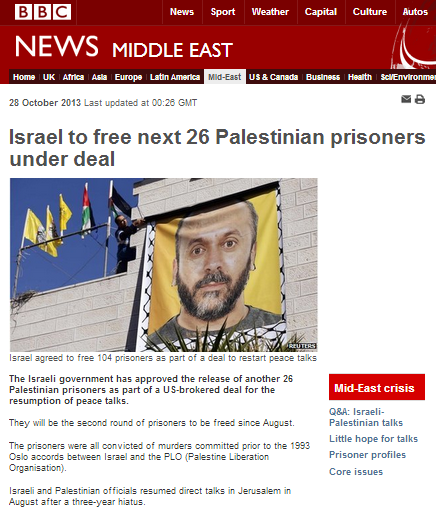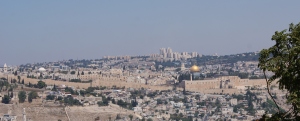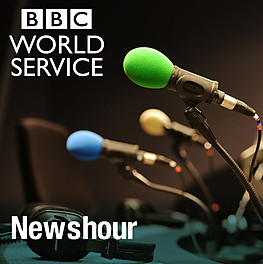BBC News website coverage of the upcoming election in Israel continued on March 13th with an article by Kevin Connolly which appeared in the Middle East page’s ‘Features & Analysis’ section under the title “Israel election: Will outcome revive peace process?“.
Oddly, the main photograph chosen to illustrate that article has nothing to do with the Israeli election, as can be seen in its original description.
The BBC however replaced the original caption with one of its own:
“Peace talks between Israel and the Palestinians have been shelved for nearly a year”
No attempt was made to remind readers that the previous round of talks came to an end because the Palestinian Authority chose to form a ‘unity government’ with Hamas.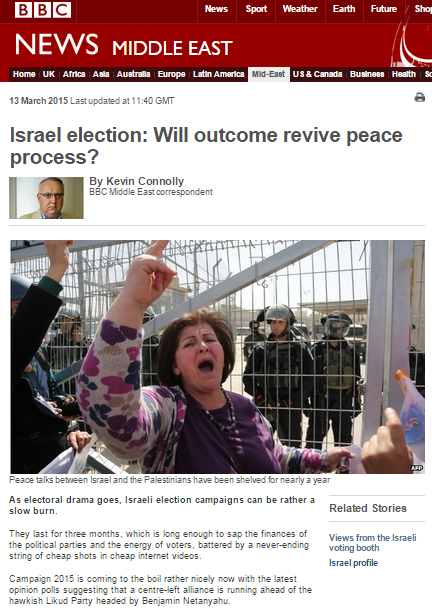
Connolly’s article frames the fate of the ‘peace process’ as being entirely dependent upon political developments on one side of the negotiating table. That portrayal is not only obviously absurd but it actually hinders audience understanding of the fact that the reason why that topic is not a major campaign issue in this election is precisely because the majority of Israelis understand that progress on that issue is not dependent on their government alone.
“Outsiders, though, might be surprised that the moribund state of the vexed peace process between Israel and the Palestinians has never felt like a major campaign issue.
It is there in the background all the time, of course, as the central historical and strategic issue that his faced this country since the Middle East war of 1967 when it captured Gaza from Egypt and the West Bank from Jordan.”
Connolly claims that:
“Voters know that the Zionist Union – the name chosen for the alliance between Yitzhak Herzog’s Labour Party and Tzipi Livni’s movement Hatnuah – would approach the prospect of talking to the Palestinians about a “land-for-peace” deal with more enthusiasm than Mr Netanyahu.”
He neglects to note that a no less enthusiastic Tzipi Livni was Israel’s chief negotiator under the Netanyahu government during the last round of unsuccessful talks. His trite presentation also fails to take into account that Herzog’s vision (including on Jerusalem) is not vastly different from that proposed during the previous negotiations under the Likud-led government or that offered by Ehud Olmert in 2008.
“Herzog said he would try to reignite a process using Egyptian and Jordanian support but that ultimately he wants to negotiate directly with the Palestinians, and that he is ready to go to Ramallah to try to reach a deal.
“It will be my role to change the lack of trust between the leaders and peoples,” he said. “I don’t believe in any unilateral withdrawal. The lessons from Gaza are learned.”
When asked what land he would keep, he said that “in the ideal world, I would like to keep it all.” He said he would keep the Gush Etzion, Ma’aleh Adumim and Ariel blocs, and that the Jordan River would be his security border.”
Towards the end of his article Connolly introduces his readers to the Joint Arab List.
In fact, the Joint Arab List is made up of four parties – not three as Connolly claims. Brought about by the new regulations concerning the electoral threshold, the combined list includes representatives from the Jewish/Arab far Left party Hadash, the anti-Zionist Balad party, the Ta’al party and the United Arab List (Southern Islamic Movement). Whether or not that unlikely alliance of communists, Islamists and Palestinian nationalists will indeed have the effect of raising the turnout among Arab-Israeli voters (a topic on which Connolly has been wrong before) remains to be seen.
At the end of his article Connolly stubbornly returns to the subject this election is not about with the following statement:
“How quickly the issue [the peace process] re-asserts itself will depend on whether victory goes to the left or to the right.”
Beyond the fact that his claim is debatable if only for the simple reason that Israel is not the only party upon which negotiations depend and the PA has shown in the past year that its strategy has shifted to the international arena, it is revealing to see yet another example of the BBC’s obsessive-compulsive focus on a topic which Connolly himself admits – in an article ostensibly about the Israeli elections – is not on the electorate’s agenda.

